考虑残差网络和bigru注意的电力系统暂态稳定评估方法
IF 1.9
Q4 ENERGY & FUELS
引用次数: 0
摘要
传统的电力系统暂态稳定评估(TSA)模型存在三个缺点:故障时的关键信息捕获困难,不区分非周期和振荡不稳定状态,可再生能源渗透率高的系统泛化能力差。为了解决这些问题,本研究提出了一种新的TSA ResGRU架构。首先,利用残差神经网络(ResNet)对瞬态信息进行深度特征提取;其次,采用双向门控循环单元结合多注意机制(BiGRU-Attention)建立时间特征依赖关系。它们的组合构成了一个基于ResGRU架构的TSA框架。该方法预测了三种瞬态条件:振荡不稳定、非周期不稳定和稳定。在离线训练阶段,采用热重启(SGDR)优化算法的随机梯度下降法对模型进行离线训练。这大大提高了模型的泛化性。最后,在IEEE 145总线和39总线系统上进行了仿真测试,验证了该方法比传统的TSA方法具有更高的适应性、准确性、可扩展性和快速性。该模型对PMU不完全配置、PMU噪声数据和丢包具有较好的鲁棒性。本文章由计算机程序翻译,如有差异,请以英文原文为准。
A transient stability assessment method for power systems incorporating residual networks and BiGRU-attention
The traditional transient stability assessment (TSA) model for power systems has three disadvantages: capturing critical information during faults is difficult, aperiodic and oscillatory unstable conditions are not distinguished, and poor generalizability is exhibited by systems with high renewable energy penetration. To address these issues, a novel ResGRU architecture for TSA is proposed in this study. First, a residual neural network (ResNet) is used for deep feature extraction of transient information. Second, a bidirectional gated recurrent unit combined with a multi-attention mechanism (BiGRU-Attention) is used to establish temporal feature dependencies. Their combination constitutes a TSA framework based on the ResGRU architecture. This method predicts three transient conditions: oscillatory instability, aperiodic instability, and stability. The model was trained offline using stochastic gradient descent with a thermal restart (SGDR) optimization algorithm in the offline training phase. This significantly improves the generalizability of the model. Finally, simulation tests on IEEE 145-bus and 39-bus systems confirmed that the proposed method has higher adaptability, accuracy, scalability, and rapidity than the conventional TSA approach. The proposed model also has superior robustness for PMU incomplete configurations, PMU noisy data, and packet loss.
求助全文
通过发布文献求助,成功后即可免费获取论文全文。
去求助
来源期刊

Global Energy Interconnection
Engineering-Automotive Engineering
CiteScore
5.70
自引率
0.00%
发文量
985
审稿时长
15 weeks
 求助内容:
求助内容: 应助结果提醒方式:
应助结果提醒方式:


